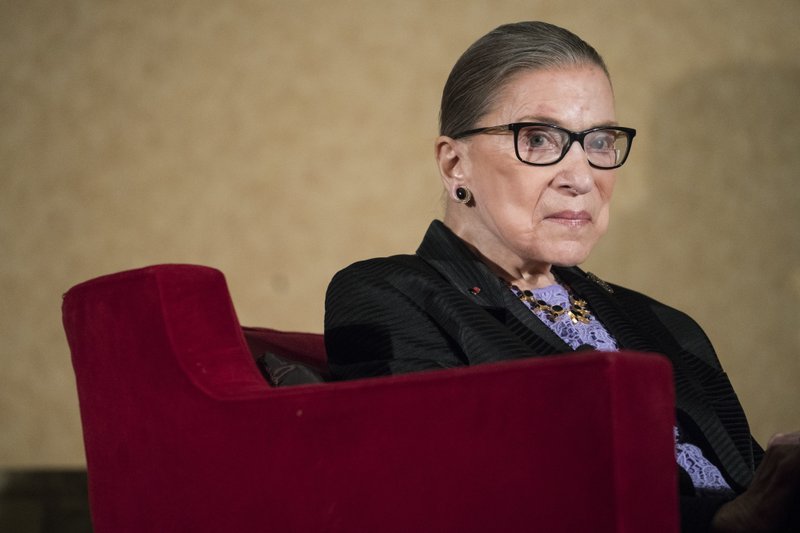WASHINGTON -- There have been just two executions since May 1, and the total for 2016 is on track to stay at a 25-year low.
Execution-drug shortages, errors in death chambers and legal challenges to sentences imposed by judges have contributed to a steep decline in the number of states that are carrying out executions.
Three states, Texas, Georgia and Missouri, are using the death penalty with any regularity, though Texas has not executed anyone since April. Four executions are scheduled in the state before the end of the year.
The reduction in executions and in the number of states that are enforcing death sentences led Supreme Court Justice Ruth Bader Ginsburg to conclude recently, "I think the death penalty is fading away."
There is not enough support on the court to abolish capital punishment, but that may not be necessary, Ginsburg said.
"Most states don't have any executions. The executions that we have are very heavily concentrated in a few states and even a few counties within those states," she said in an interview in July. Ginsburg joined a lengthy dissenting opinion by Justice Stephen Breyer last year that highlighted problems with the death penalty that led the two justices to conclude that it probably is unconstitutional.
States that have had to halt executions, though, are trying to figure out how to resume.
Ohio and Oklahoma are among states that intend to restart executions once they have corrected problems in their death chambers.
Ohio, which last executed an inmate in January 2014, has set a Jan. 12 execution date for a man convicted of raping and killing a 3-year-old girl in Akron.
But it's unclear whether his execution, or more than two dozen others that are scheduled into 2020, will take place because the state lacks execution drugs and has struggled to find a supplier, as have other states.
In Ohio's last execution, in January 2014, Dennis McGuire gasped and snorted repeatedly during a 26-minute execution that used a combination of two drugs that had never been tried before in an execution.
That protocol has since been eliminated, and those drugs aren't available for executions.
Oklahoma's last execution was in January 2015. The state's prison system is expected to adopt new execution procedures soon. Even then, Attorney General Scott Pruitt has said, he will wait at least another five months before asking a court to schedule an execution.
Oklahoma imposed a moratorium on the death penalty after two problem-filled executions and a third that was called off when prison officials noticed they received the wrong drug. The top lawyer for Gov. Mary Fallin urged officials to go forward anyway, telling another lawyer to "Google it" to confirm the drug could be used, according to a grand jury investigation.
Alabama and Florida haven't put anyone to death since January because of questions about the way death sentences are imposed in those states.
Even Texas, which has executed more people since the modern resumption of the death penalty in 1976 than the next six states combined, has experienced a reduction in executions.
The state's highest criminal appeals court has stopped four executions in the past month, though each case raised different concerns. Separately, the U.S. Supreme Court will take up two Texas death-row cases in the coming months, also involving separate issues.
In Arkansas, plans to execute up to eight inmates before the end of the year have been delayed by the legal challenges and difficulty obtaining drugs that have kept the state from carrying out executions since 2005.
In June, the Arkansas Supreme Court upheld a 2015 law that changed the state's method of execution to a three-drug cocktail, while exempting the drug's suppliers from public-disclosure laws.
The nine death-row inmates challenging the law announced plan to appeal to the U.S. Supreme Court, and the Arkansas justices agreed to delay executions while awaiting word from the high court.
On Tuesday, Jeff Rosenzweig, a lawyer for the inmates, said he had yet to file a request, due in October, for the U.S. Supreme Court to hear the case. The Supreme Court does not have to take action on the case until after the next batch of the state's drug supply expires in January.
A different supply of one the state's three execution drugs expired at the end of June, but the Department of Correction said in July that it was able to find a new supply.
There are 34 prisoners on death row in Arkansas.
California has the largest death-row population, 746 inmates as of early August, but hasn't executed anyone in 10 years.
oters in the nation's most populous state will consider separate ballot questions in November that would abolish the death penalty on the one hand and speed up the appeals process on the other.
There have been 15 executions this year nationwide. At the current pace, there would be 19 executions by the end of 2016, the fewest since 1991, when 14 people were put to death.
The most since then was in 1999, when there were 98 executions.
Information for this article was contributed by Mark Sherman, Sean Murphy and Andrew Welsh-Huggins of The Associated Press and by John Moritz of the Arkansas Democrat-Gazette.
A Section on 09/09/2016
